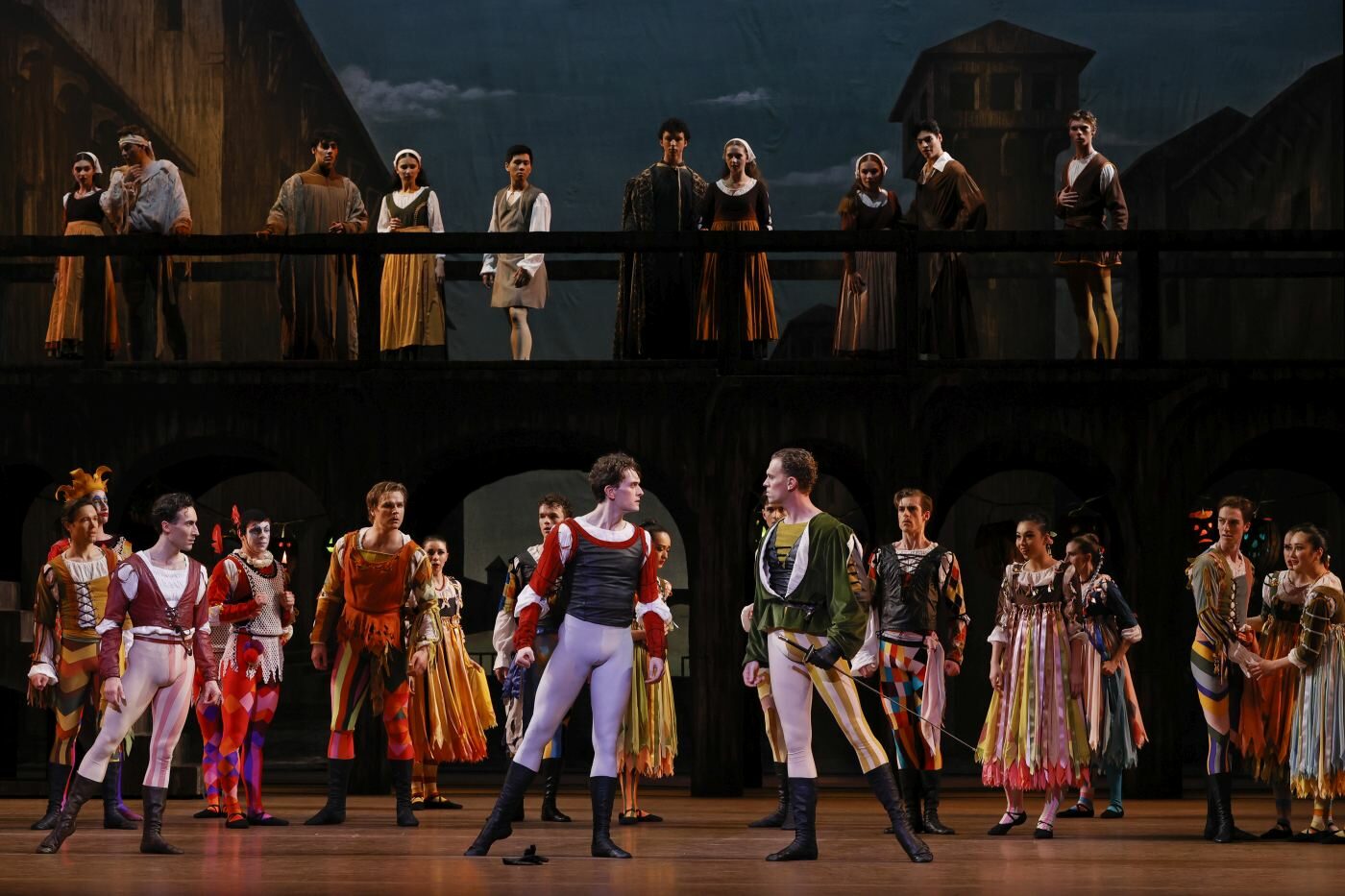Focus on: Kirill Serebrennikov – A Panel Discussion
Stuttgart State Opera
Stuttgart, Germany
October 22, 2017
by Ilona Landgraf
Copyright © 2017 by Ilona Landgraf
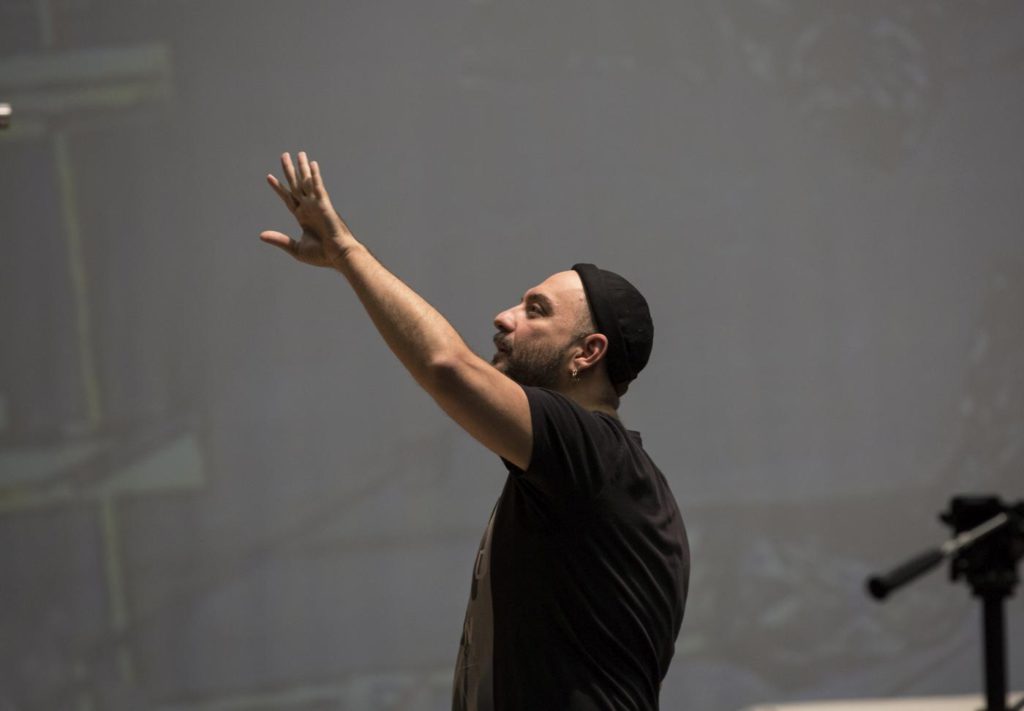 This October, the Stuttgart Opera House premiered an unfinished work: “Hansel and Gretel” by Engelbert Humperdinck. Initially, the opera house chose to have Kirill Serebrennikov stage the piece. However, Serebrennikov was detained on August 22nd, and has remained under house arrest in Moscow since then. Many have speculated that the accusations brought against the artist might be pure invention.
This October, the Stuttgart Opera House premiered an unfinished work: “Hansel and Gretel” by Engelbert Humperdinck. Initially, the opera house chose to have Kirill Serebrennikov stage the piece. However, Serebrennikov was detained on August 22nd, and has remained under house arrest in Moscow since then. Many have speculated that the accusations brought against the artist might be pure invention.
Since early October the Stuttgart State Opera has been running a retrospective on Serebrennikov that encompasses his works for opera, theater, ballet and cinema, presented in an exhibition, a series of lectures, and two rounds of talks.
One of these talks took place hours before the premiere. Three firmly established members of the Russian art scene discussed the current situation of art and artists in Russia: Marina Davydova (theater critic, – historian, and – producer), Valeriy Pecheykin (screen-writer, playwright, and in-house writer and dramaturge of the Gogol Center Moscow) and Sergej Newski (composer, born in Moscow). Sonja Zekri, head of the arts section of the Sueddeutsche Zeitung, moderated the talk. Dmitry Kunyaev, dramaturge of the Stuttgart State Opera, translated between Russian and German. The talk was filmed by SWR Television for a documentary that will be broadcast on November 19th, 2017.
The transcript below is based on a recording.
S. Zekri:
Welcome to a lecture that actually shouldn’t exist. “Free Kirill” is written on a banner outside the Stuttgart Opera House and we are thinking and talking about a stage director, an artist, who was unable to complete a work that needed to be finished. I’m very happy to see so many people in the audience and to see that public interest isn’t only focused on “Hansel and Gretel”, which is presumably the most difficult opera project in Germany at the moment. Kirill Serebrennikov began work on this project, but was forced to abandon it.
But before we discuss the reason that Kirill Serebrennikov needed to stop his work, we’ll talk about what’s happening with Russia’s cultural policy. And even though I assume that we won’t come to conclusive answers, please do not be discouraged. It will be difficult enough just to approach the subject of what has happened in Russia.
Kirill Serebrennikov is dealing with what happened in Russia right now. House arrest for an artist – what is that like?
 M. Davydova:
M. Davydova:
I’ve got a feeling people can’t really imagine what being under house arrest means. They believe that some limited communication with the world is possible and that someone – if they absolutely want to – can send Kirill an email or phone him – but that’s not the case. For an artist like Kirill, the punishment is especially hard, because he’s a workaholic. He has to stay in a relatively small apartment in Moscow – around 30-40 square meters – and is completely isolated from the outside world. Yet Kirill has been able to pull off several projects since the first raid [of the Gogol Center] on May 23rd. This June, the opera “Chaadsky” [by Alexander Manotskov, directed by Kirill Serebrennikov] premiered at the Helikon-Opera in Moscow; immediately afterwards, he began rehearsals for the ballet “Nureyev” at the Bolshoi Theatre, which includes around 600 participants. Following this, he began shooting for his film “Leto” (“Summer”) in St. Petersburg. This work was interrupted by the arrest. On September 15th,, Kirill’s staging of “Little Tragedies” by Pushkin premiered at the Gogol Center. At this time, he already was no longer able to work.
In the judicial hearing last Tuesday, Kirill asked for five additional days of shooting to finish “Leto”. He even offered to film in the presence of armed soldiers, positioned behind him with Kalashnikovs, but permission was denied.
S. Zekri:
The Gogol Center is directly affected by Kirill Serebrennikov’s arrest. He’s the Center’s artistic director and the season has begun. Valeriy Pecheykin, how does the artistic work go on in a house where the artistic director has been lost?
V. Pecheykin:
Everyday work still continues and I’m going to work as before. At the moment, we’re working and waiting. We act as if everything were all right. I would like to thank our first deputy director, Aleksey Kabeshev, at this moment for not having declared a state of emergency. Instead, we function, we work, as if nothing has happened. Every employee has continued to do their work. Maybe it’s a bit easier for the actors to block out reality than it is for me, because they are trained in the Stanislavski method and can work with the concept of the fourth wall between the stage and the auditorium. They are pretty good at using this method – at least more so than I am.
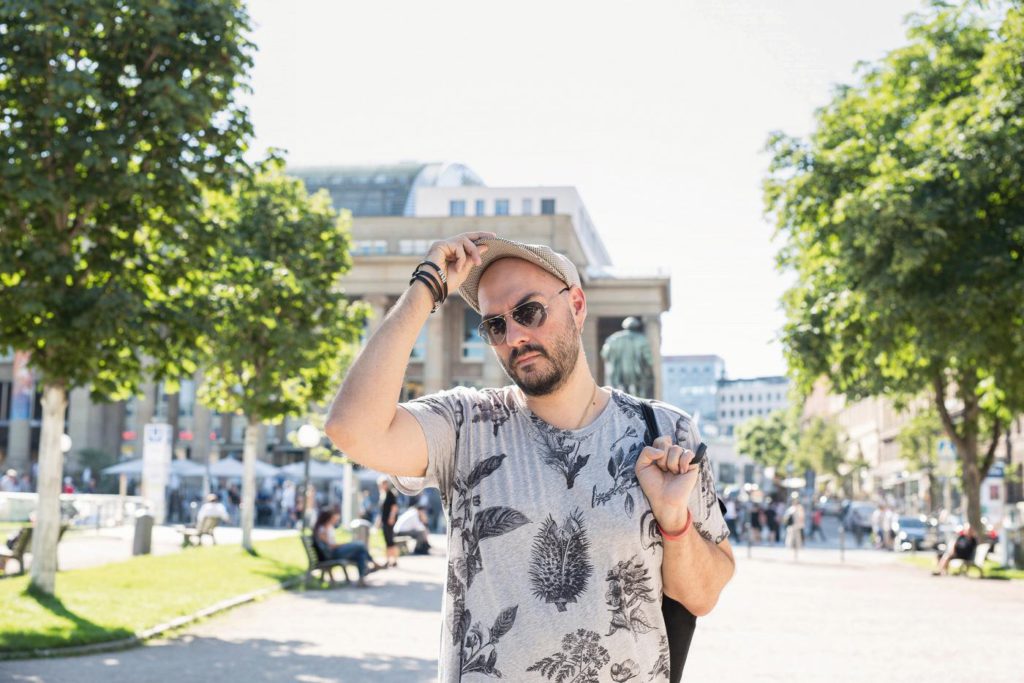 The day before yesterday I was especially happy to learn that Kirill was able to start rehearsals for a project that he had planned while still free. We’re looking forward to the next premiere at the Gogol Center. The schedule has proceeded as planned, but it’s very difficult to plan for a timespan longer than six months without Kirill. We’re just waiting for any change in the meantime so that we can develop new plans.
The day before yesterday I was especially happy to learn that Kirill was able to start rehearsals for a project that he had planned while still free. We’re looking forward to the next premiere at the Gogol Center. The schedule has proceeded as planned, but it’s very difficult to plan for a timespan longer than six months without Kirill. We’re just waiting for any change in the meantime so that we can develop new plans.
S. Zekri:
Sergej Newski, you’ve worked together with Kirill, you’ve known him for a long time and, like the others, you’re appalled by the situation. You live in Berlin currently, but when you look at Russia, do you have the impression that Russian artists are expressing sufficient support for Kirill Serebrennikov? Is there enough solidarity? How do you perceive the reactions of Russian artists?
S. Newski:
Of course there are artists who support Kirill, including the seventy bailsmen who signed for him. There are some very famous names among them – the crème de la crème of the Russian cultural scene – but it has not had any effect. An event like this talk here would be hard to imagine in Moscow, but it would be good if some institutional support emerged. Some statements have been made, though – for example by several general directors. The director of the Perm Theatre, where I just worked, called what has happened “a farce.” Vladimir Urin, the Bolshoi Theatre’s general director, acted absolutely correctly as well. There has been no mass action, but that’s hard to imagine in Russia too, because people are under extreme pressure. The actions taken against Kirill have been interpreted as a general worsening of the situation.
M. Davydova:
The list of seventy people who were prepared to post bail includes the names of the leading members of the cultural community. These people are willing to stand surety for Kirill, using their own names and their own finances, but to zero effect. They weren’t even recognized by the people in power. That’s a slap in the face to these artists – people with very different opinions about culture and politics who closed ranks for one cause and have been ignored.
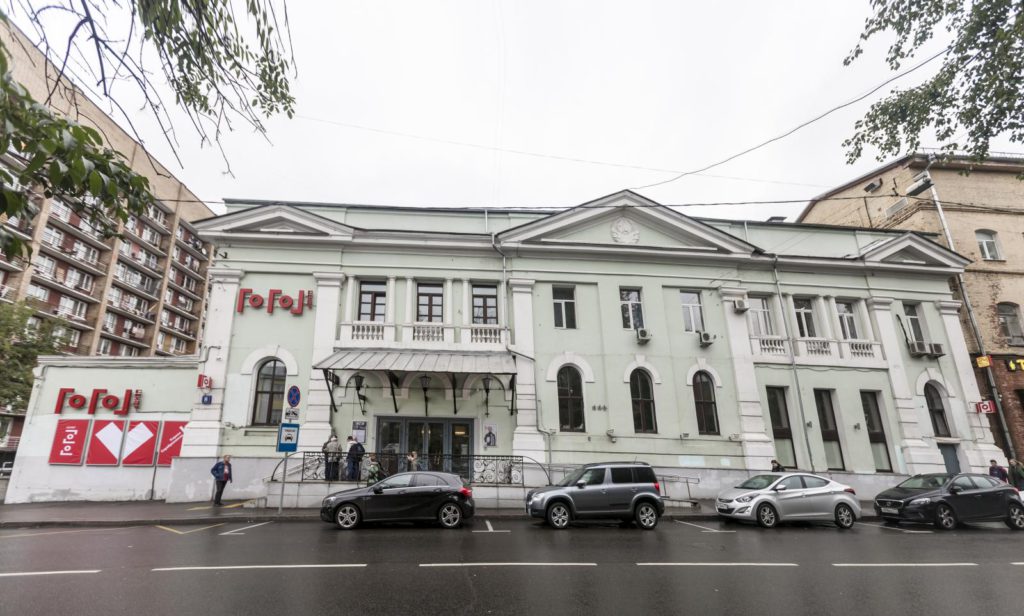 I’m optimistic and pessimistic at the same time. When we look to the history of the processes against [Vsevolod] Meyerhold and [Alexander] Tairov, the solidarity among colleagues was practically nonexistent. On the contrary, they distanced themselves from those being persecuted. However, this situation has changed for the better.
I’m optimistic and pessimistic at the same time. When we look to the history of the processes against [Vsevolod] Meyerhold and [Alexander] Tairov, the solidarity among colleagues was practically nonexistent. On the contrary, they distanced themselves from those being persecuted. However, this situation has changed for the better.
The reason why I’m pessimistic is that the engagement of the people working in the arts doesn’t extend beyond signing letters of support. Initiatives like this talk today are impossible there. If foreign journalists ask me what kinds of actions are planned in Russia, my answer is very short: none at all.
S. Zekri:
Sergej Newski, you mentioned that this underwhelming reaction of Russian artists and the Russian public reflects the atmosphere within the country. Nonetheless, the first people affected by what happened to Kirill Serebrennikov are artists. How have they reacted? Not only in the sense of showing solidarity, but also in terms of considerations like: Will I be hit next? Can I still work here? Do Russian artists sit on packed suitcases?
S. Newski:
Each person’s story is different and I can’t speak for all artists at once. Valeriy Pecheykin, for example, who has to work with the Russian language, would find it difficult to establish himself here. With me, it’s different. By 2013, when it became clear in which direction the situation in Russia would develop, I went to my publisher in Berlin and said: I need more commissions in Europe. But I never cut my connection with Russia. Working in Russia is precious to me – not only because of the projects, 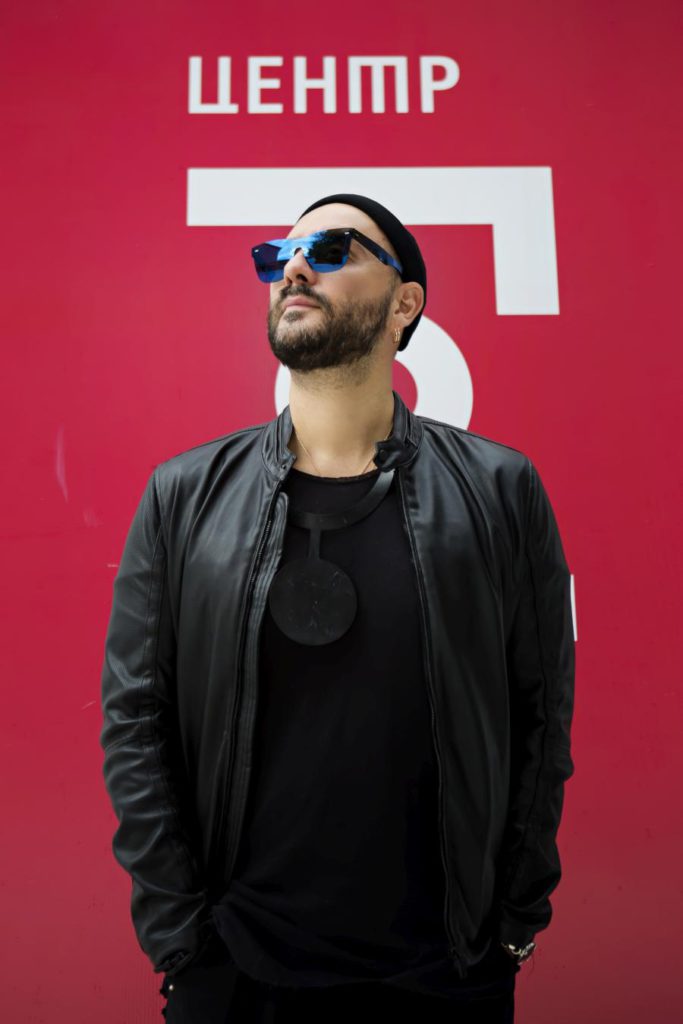 but also because of the feedback I get in Russia. I think this feedback has been important for Kirill too. The process enacted against him has affected many people because he has a broad network – but it is exactly this network that has elicited criticism. He is loved by politicians, by oligarchs, by artists, by common folk – by many people! The hashtag #myfriendKirillSerebrennikov united many people. You get enormous feedback when working in Russia and I will work there as long as possible. But people are simply scared to stay there.
but also because of the feedback I get in Russia. I think this feedback has been important for Kirill too. The process enacted against him has affected many people because he has a broad network – but it is exactly this network that has elicited criticism. He is loved by politicians, by oligarchs, by artists, by common folk – by many people! The hashtag #myfriendKirillSerebrennikov united many people. You get enormous feedback when working in Russia and I will work there as long as possible. But people are simply scared to stay there.
S. Zekri:
The media in the west has periodically described Kirill Serebrennikov as a director in opposition, but that’s actually not correct. He hasn’t been an oppositionist or dissident and he hasn’t understood himself to be one either. What’s much more pressing is this question: why him? Why did the people in power lash out at him?
V. Pecheykin:
I wish I had known the answer half a year ago and had been able to warn Kirill. Sadly, I neither know the answer nor do I know how this story will end. I’m often asked questions and before answering I try to check whether the answer passes several filters. I know for sure that I can’t improve the situation for Kirill, so my main concern is not to worsen things for him. Admittedly, the artists living in Russia like me recently experienced a defeat. We were permitted to learn that people in power would follow one specific pattern. We roughly know what might happen next if we say something in particular. There is competition in social networks about forecasting the worst case scenario – and it follows this logic: If you want to be a prophet then predict the worst.
M. Davydova:
“Why Kirill?” would presumably be the key question that could cast a light on the political background of this situation. According to one western point of view, Kirill is no oppositionist. He is not a member of a political party and doesn’t carry out any political tasks. But one has to understand that the question of aesthetic by now has become a political issue in Russia. For someone in the west, it might be difficult to comprehend that the aesthetic of art is very much regulated. The moment you break a rule or change it, you enter into a political sphere, and from this perspective Kirill could be declared an oppositionist, because he was free as an artist and did exactly that. Kirill acted in opposition to the theater scene for a long time, and only during a short period of time, between 2008 and 2012…
S. Newski:
It had already begun in 2005.
M. Davydova:
… even Russia’s cultural ministry declared in written form that modern art had to be supported. Even Dmitry Medvedev, then the president, stated on record that innovative art had to be supported. And when searching for those within the theater scene that supported and helped to develop innovative art, Kirill was presumably the only one, the key figure. Those in power approached Kirill through their own initiative, offering him funding. That’s how the project “Platforma” came about, for which Kirill is being prosecuted right now. But most attempts to modernize do not continue for long in Russia, and very quickly they evoke an intense conservative counter-reaction. After the transition of power in 2012, a wave back to conservatism built up. Kirill represents the modernizing processes, and that’s why he was chosen to be the victim. The court proceedings against him are hugely reflective of the tension between the cultural ministry and modern, innovative forces. They have put an artist at the center of a political conflict.
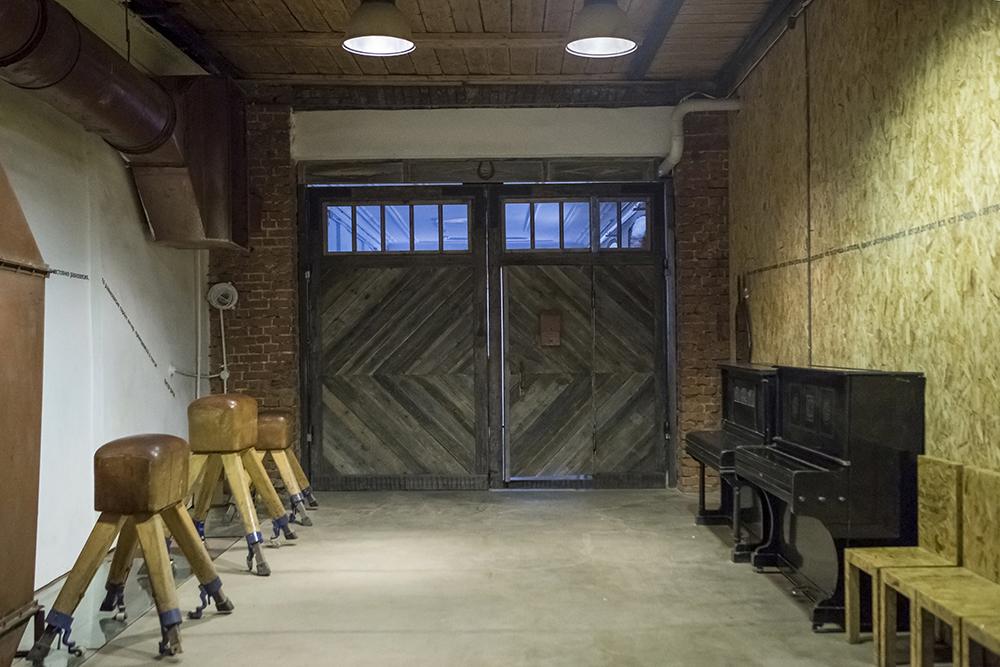 S. Zekri:
S. Zekri:
So this is the reckoning of President Putin against the former President Medvedev?
S. Newski:
Not just that.
Twelve years ago, the festival “Territory” was founded by Kirill Serebrennikov and Theodore Curentzis (among others). On the first page of its program booklet, you could read a greeting by then-First Deputy Chief of the Kremlin administration, Vladislav Surkov. He was in touch with many, many artists and tried to be a bridge between the Kremlin and the Russian art avant-garde. However, each party wanted to pull the other over the barrel. The artists believed that they would be able to achieve something for modern art in Russia, whereas the Kremlin thought it could domesticate the artists and utilize them for its own goals. But at least modern art experienced a short heyday.
In 2011, intense demonstrations took place. After these mass demonstrations, Surkov was accused of supporting the opposition and was forced to resign.
On February 2nd, 2011, a meeting between President Medvedev and artists took place in which all the participants agreed upon the project “Platforma”. I contributed to this decision. At one point, though, a sort of disappointment occurred on both the artists’ and the politicians’ side. It was triggered by the fact that people had started to demonstrate and when Putin came into power again, he came to the glorious conclusion that the cultural elite was no longer needed. Everything that has happened after 2012 has been an attempt to quash this previous change of the elite. Informers, city weirdos, biker and priests – that’s the elite that has gathered around Putin.
Modern art has been massively under pressure in Russia since 2012.
S.Zekri:
What does Putin want? Does he want anything at all? Experience teaches that if someone can intervene, then it’s him. What kind of role does he play in this case?
V. Pecheykin:
Actually, Mr. Putin is not playing a role – but we are playing the roles he designed for us in this drama. He’s sitting there like an enormous eagle, observing how the situation develops. I’m not even sure whether Vladimir Putin instigated all of this. The cultural scene and the political scene are definitely drifting apart, and Kirill crossed a certain border behind which lies a black 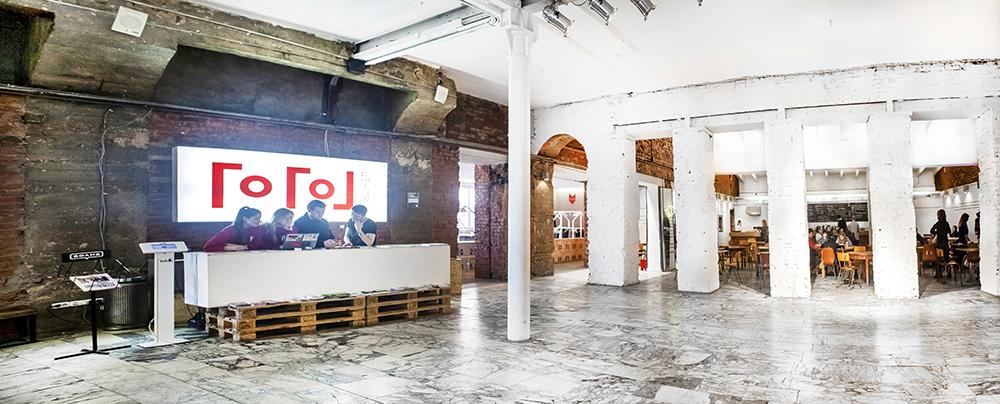 hole. He has disappeared into this hole, so to speak. As Sergej Newski said, the cultural and the political elites met in 2005 and both sides aimed to pull the other over the barrel. Basically, the story follows the same scheme as the performance of “Tosca” that I saw here yesterday evening. Everyone betrays everyone, and in the end the artist Cavaradossi is shot dead. But it also reminds me of a scene from Mikhail Bulgakov’s novel “Heart of a Dog”. In the scene, a new group of people comes to Professor Preobrazhensky and demands something, and he becomes so upset that he picks up the receiver to call his patron – but can’t reach anyone! It’s the same these days. Even if we try, we won’t reach anyone in authority because the connection was cut.
hole. He has disappeared into this hole, so to speak. As Sergej Newski said, the cultural and the political elites met in 2005 and both sides aimed to pull the other over the barrel. Basically, the story follows the same scheme as the performance of “Tosca” that I saw here yesterday evening. Everyone betrays everyone, and in the end the artist Cavaradossi is shot dead. But it also reminds me of a scene from Mikhail Bulgakov’s novel “Heart of a Dog”. In the scene, a new group of people comes to Professor Preobrazhensky and demands something, and he becomes so upset that he picks up the receiver to call his patron – but can’t reach anyone! It’s the same these days. Even if we try, we won’t reach anyone in authority because the connection was cut.
M. Davydova:
When journalists from abroad ask me about Putin, I always think that they have no real understanding of Russia’s political structure. You can imagine it like this: you sit in the audience, and on the still-closed curtain is written “Putin”. But you don’t know what will happen after the curtain rises. Which play will be performed?
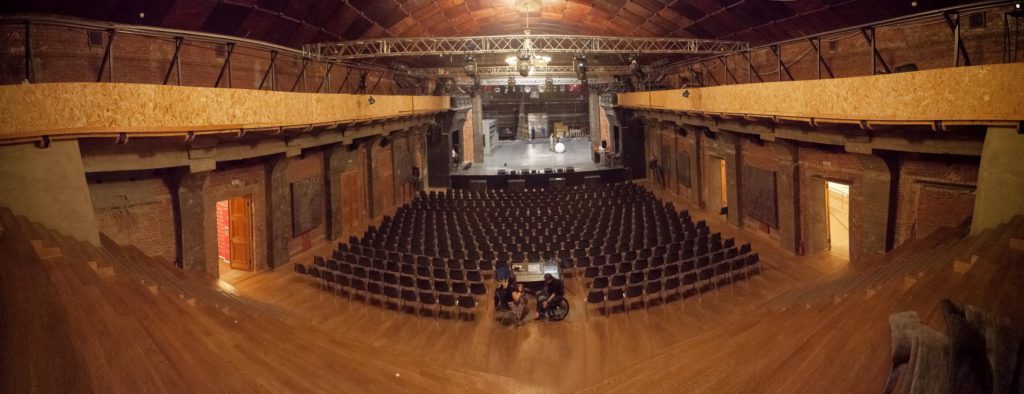 We talked about 2005, for example, the year that Vladimir Putin was president of Russia and met with the cultural scene. Now, it’s 2017. Again, Putin is president, but a meeting between him and these artists is absolutely impossible. An evolution has taken place, but we call both periods Putin’s. What remains unchanged is the break-up of society into the pro-west faction, which wishes for new and innovative work, and the conservative faction, which is orientated towards medieval times. The only differences are that the second faction, which wasn’t that influential in 2005, grew stronger in the meantime, and that the people in power now associate themselves with that faction. Since the mass demonstrations in 2012 the conservatives have played a stronger and stronger role for Putin. He reached their level and, at the moment, is their equal.
We talked about 2005, for example, the year that Vladimir Putin was president of Russia and met with the cultural scene. Now, it’s 2017. Again, Putin is president, but a meeting between him and these artists is absolutely impossible. An evolution has taken place, but we call both periods Putin’s. What remains unchanged is the break-up of society into the pro-west faction, which wishes for new and innovative work, and the conservative faction, which is orientated towards medieval times. The only differences are that the second faction, which wasn’t that influential in 2005, grew stronger in the meantime, and that the people in power now associate themselves with that faction. Since the mass demonstrations in 2012 the conservatives have played a stronger and stronger role for Putin. He reached their level and, at the moment, is their equal.
 When asking how much personal interest Putin has in Serebrennikov, the answer is zero. Presumably, Putin does not even know exactly who Kirill Serebrennikov is. He doesn’t feel personally related to him – but he relies on the part of society for which Kirill Serebrennikov is the stereotypical enemy. Those people approach Putin and tell him, “We have to ruin this person – you have to allow this.” And Putin says “OK”.
When asking how much personal interest Putin has in Serebrennikov, the answer is zero. Presumably, Putin does not even know exactly who Kirill Serebrennikov is. He doesn’t feel personally related to him – but he relies on the part of society for which Kirill Serebrennikov is the stereotypical enemy. Those people approach Putin and tell him, “We have to ruin this person – you have to allow this.” And Putin says “OK”.
S. Zekri:
Sergej Newski, we’ve heard about the conservative forces that have gained strength over the last few years. How should we imagine this? Are we talking about one archimandrite somewhere in the Russian province? About an organization or oligarchs with a monarchist-orthodox or other nationalist world view? What exactly are these driving conservative forces, whereby “conservative” is a euphemism for what has actually happened.
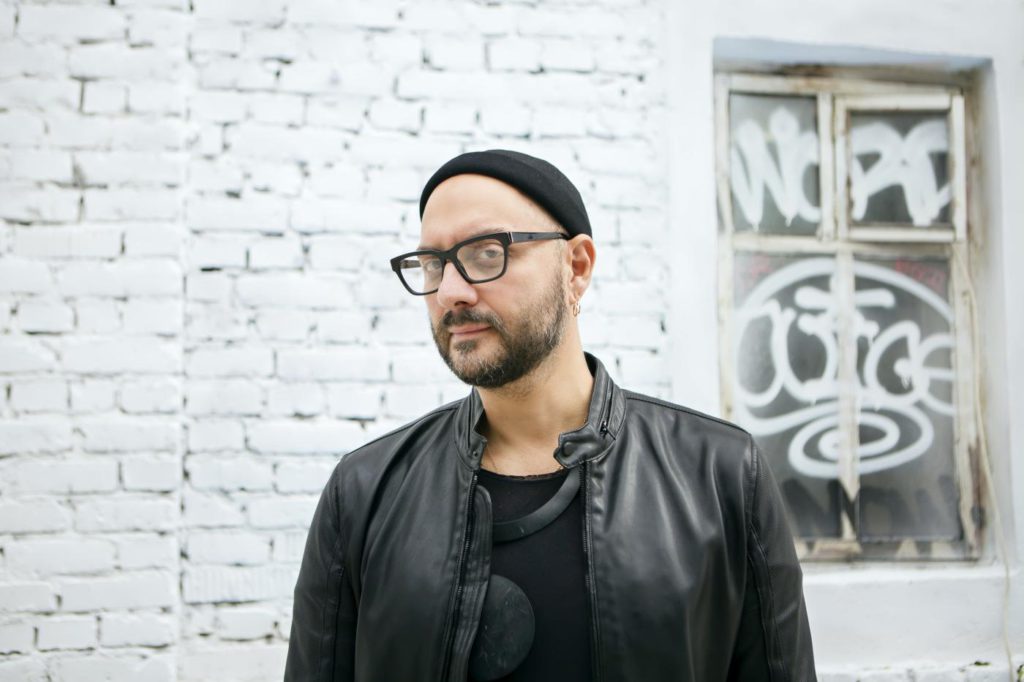 S. Newski:
S. Newski:
When talking about this, we have to imagine that Putin probably expects human beings to be bad and strive for the bad, what’s the normal attitude of a secret service member and what’s also the mindset of the conservative forces. That could be called Social Darwinism from every point of view. Moral rules have been switched off in Russia and the country has shifted towards fascism under the banner of pseudo-religiosity – which has nothing to do with true religion – because the latter is moral and ethical itself. But the Russian Orthodox Church has little to do with morals, but very much to do with the secret service. And a connection between the secret service and the Russian Orthodox Church is the worst that can happen to us.
S. Zekri:
Before we discuss whether and how the situation might be resolved for Kirill Serebrennikov, I’d like to talk about the allegations he faces. Sergej Newski, you were in charge of the music for “Platforma”, a multidisciplinary three-year-project. Kirill Serebrennikov is accused of having embezzled 86 million ruble – that’s around 1 million euro. It’s claimed that he brought “Platforma” into being solely with intent to embezzle the funding. Is that a realistic scenario? He takes 86 million ruble, organizes countless events and performances for a period of three years, and has money left? Maybe we should tell that to Jossi Wieler [Intendant of the State Opera Stuttgart].
S. Newski:
He’d presumably hire me right away!
The idea behind “Platforma” was very good. It was an attempt to create a crowd-puller made of dance, theater, new music, and modern art. The budget was quite generous, but if you work on a free stage with invited artists, you have to pay for everything – lighting, sound, seats for the audience and so on. Every item is expensive. Such projects demand a high level of professionalism, and I’ll never forget the professionalism of Alexei Malobrodsky, the former director of the Gogol Center, who was arrested in June, and of the members of the staff who are subjected to hearings.
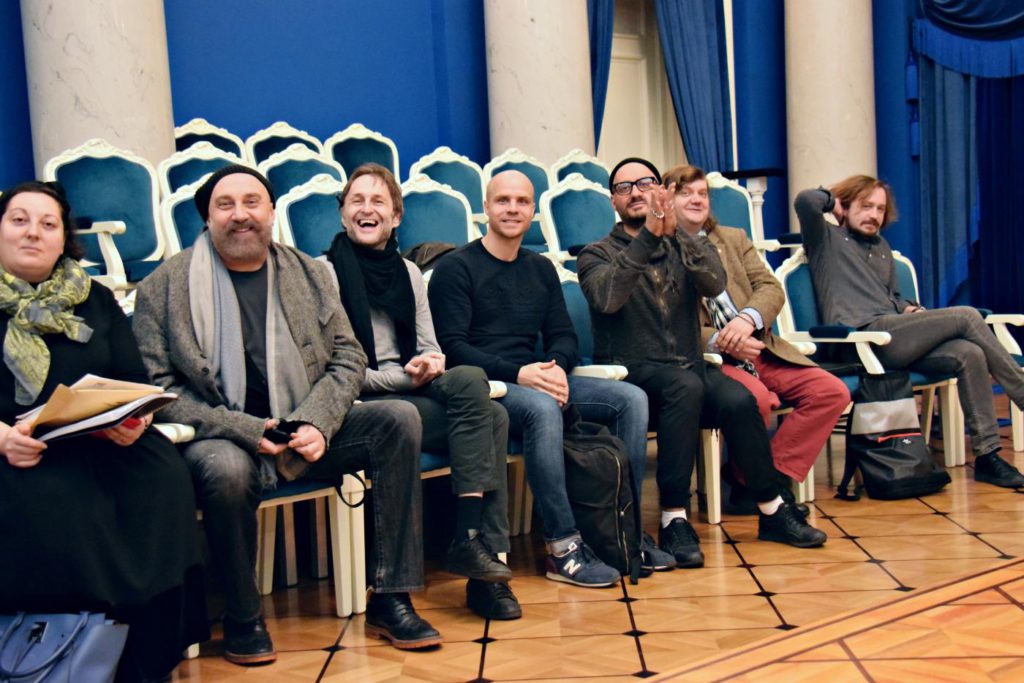 S. Zekri:
S. Zekri:
One theater expert stated with regard to the allegations raised against Kirill Serebrennikov that government funding for theaters is such a difficult, complicated, and obscure matter that the only way to remain unassailable is to abstain from staging a performance, shooting a film, or organizing an exhibition. Marina Davydova, through which perspective is this non-transparent financing of theaters a gateway for subsequent prosecution?
M. Davydova:
All Russian theaters depend on the state. All big theaters are financed by the state, and even if small theaters receive money from sponsors, they still depend on the state, simply because they use or rent a building that is government property. Making theater without governmental financing is a complete illusion in Russia, and the occasional calls to artists to act freely and independently disregard reality. It’s simply impossible to be free and independent! During the Soviet era, the situation was basically the same; the only small difference was the censorship. But everyone knew that censorship existed – it was official! People from the cultural advisory committee attended the general rehearsals of a play, for example, and chose one of three options: they approved the premiere, banned it, or approved it on the condition that the red flag had to disappear from scene III, for example, or that the finale had to be shortened – things like that. Soviet power was more honest in that respect; it declared what it did.
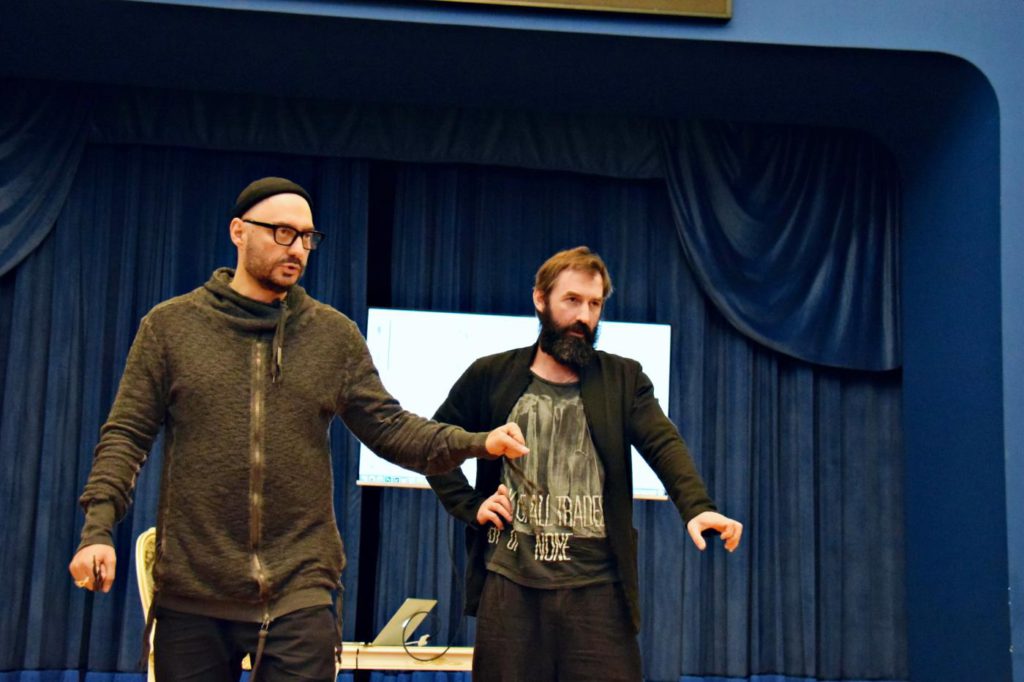 Officially, censorship doesn’t exist these days, and in principle, every artist is allowed to do what he or she wants. There is no cultural advisory committee that must approve a piece. Instead, ideological censorship was replaced by financial. Russian legislation forces artists to contravene the law if they want to create art and achieve something with it. Each theater director in Russia breaks the law – some to smaller and some to larger extents. We already mentioned that Kirill is a workaholic – and the more productions you premiere each season, the more often you can find yourself in conflict with the law. Usually, the people in power then decide which theater must undergo a financial audit. They always claim that it is only a financial issue and that the theater’s cultural policy doesn’t matter. This kind of censorship is much worse than the one in the Soviet era. During the Soviet years, an artist risked the premiere of his piece. But today, every artist in Russia knows that behind him is a managing director in charge of financing, someone who signs the contracts. This managing director approaches the artist, saying, “You know, I’ve got children, I’ve got a family. If you want to stage this particular piece, my children will be without a father.”
Officially, censorship doesn’t exist these days, and in principle, every artist is allowed to do what he or she wants. There is no cultural advisory committee that must approve a piece. Instead, ideological censorship was replaced by financial. Russian legislation forces artists to contravene the law if they want to create art and achieve something with it. Each theater director in Russia breaks the law – some to smaller and some to larger extents. We already mentioned that Kirill is a workaholic – and the more productions you premiere each season, the more often you can find yourself in conflict with the law. Usually, the people in power then decide which theater must undergo a financial audit. They always claim that it is only a financial issue and that the theater’s cultural policy doesn’t matter. This kind of censorship is much worse than the one in the Soviet era. During the Soviet years, an artist risked the premiere of his piece. But today, every artist in Russia knows that behind him is a managing director in charge of financing, someone who signs the contracts. This managing director approaches the artist, saying, “You know, I’ve got children, I’ve got a family. If you want to stage this particular piece, my children will be without a father.”
You asked which artist might be the next to be attacked. Presumably no one, because the case of Serebrennikov switched on self-censorship so effectively that there’s no need for further governmental action.
S. Newski:
Moreover, independent sponsors can succumb to pressure too, like at the Gogol Center – and, if a theater is indeed independent, it faces other difficulties. The Theatr.doc in Moscow, for example, had to change venues three times. But we’re not just talking about the financial pressure imposed by the government; we’re noticing how a governmental ideology reshapes. In 2012, the document “Principles of Cultural Policy” was released, and its principles are taught at conservatories and drama schools.
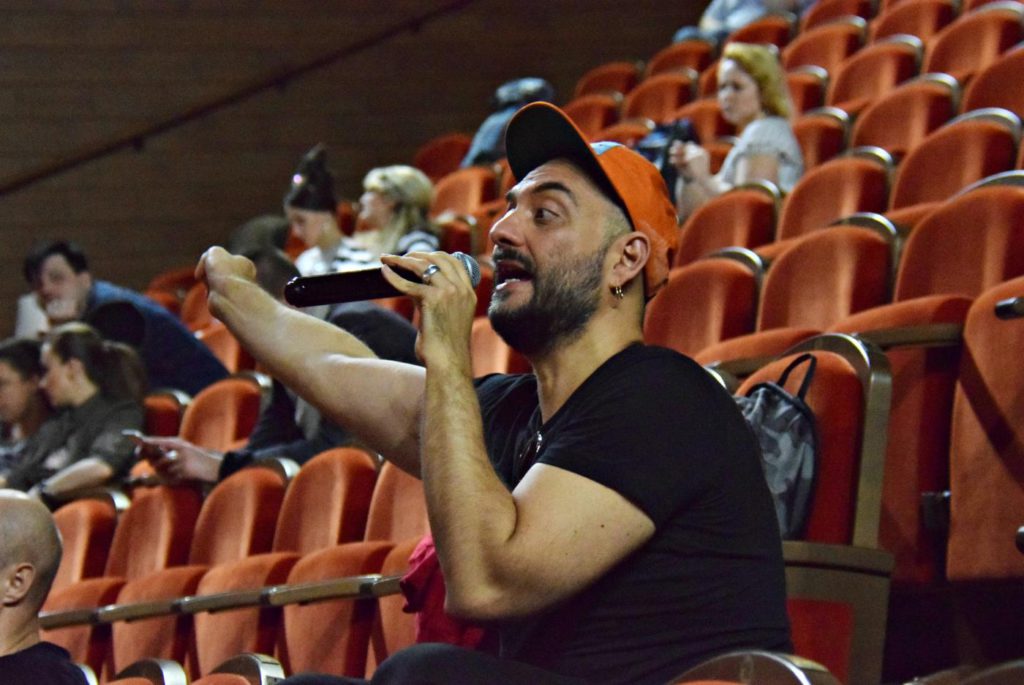 Among the people surrounding Vladimir Putin, there’s one person who might have been known as an odd villain if he didn’t spread fear: Vladimir Medinsky, the Minister of Culture. Recently, his thesis was accused of being plagiarised. However, since such affairs are managed differently in Russia than in Germany, Medinsky was discharged. We could smile about him, but since 2012 he has tried to create an ideological terrain, in which art and culture are only supported if they advocate for traditional values. Any other artists must finance their work by themselves. Until now, Medinsky’s problem was that he couldn’t find important artists who fit into his philosophy and were ready to support his doctrine. His aggression against those who do not fit into his philosophy is even more intense. Kirill is an exemplary figure in this case.
Among the people surrounding Vladimir Putin, there’s one person who might have been known as an odd villain if he didn’t spread fear: Vladimir Medinsky, the Minister of Culture. Recently, his thesis was accused of being plagiarised. However, since such affairs are managed differently in Russia than in Germany, Medinsky was discharged. We could smile about him, but since 2012 he has tried to create an ideological terrain, in which art and culture are only supported if they advocate for traditional values. Any other artists must finance their work by themselves. Until now, Medinsky’s problem was that he couldn’t find important artists who fit into his philosophy and were ready to support his doctrine. His aggression against those who do not fit into his philosophy is even more intense. Kirill is an exemplary figure in this case.
S. Zekri:
We shouldn’t forget the Gogol Center’s chief accountant Nina Maslyayeva, its general director Yury Itin, and its former director Alexei Malobrodsky, who were all detained, who have been put under pressure, and whose families suffer similarly to Kirill’s.
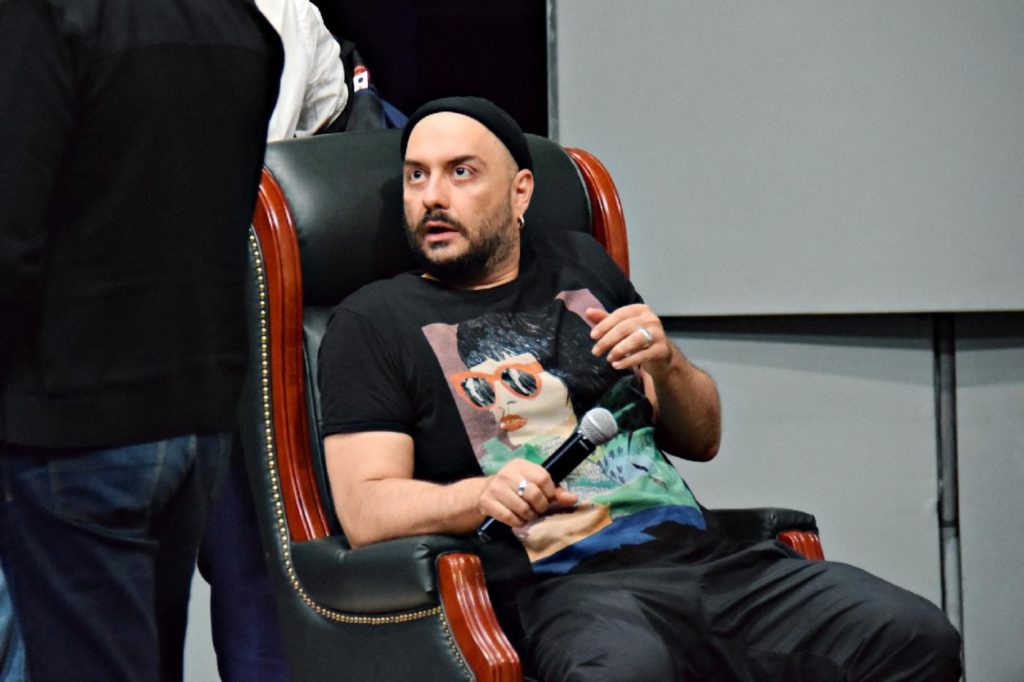 But I wanted to return to one remark by Valeriy Pecheykin. You said that you were working and waiting. On whom or on what does your hope for a solution rest?
But I wanted to return to one remark by Valeriy Pecheykin. You said that you were working and waiting. On whom or on what does your hope for a solution rest?
V. Pecheykin:
On time.
It might sound trivial, but we have hope for ourselves and on our audience. After the affair with Kirill became public, audience numbers at the Gogol Center have increased. Maybe the people in power will follow their own logic and notice that they rely on the same folks that visit the Gogol Center to maintain their power. Then they might keep their hands off the Gogol Center.
S. Newski:
That’s exactly the reason that they tried to close the Gogol Center. What drives Putin and the oligarchs around him nearly crazy is Kirill’s position. They expect that someone with his stature should have been marginalized long ago. But Kirill wasn’t, and instead enjoys massive support.
V. Pecheykin:
In Russia, folks in power have always reacted more to the numbers than to the content. The more people consolidate, the quicker folks in power react – and perhaps it’ll be the same this time.
S. Newski (complementing D. Kunyaev’s translation of V. Pecheykin’s comment):
Valeriy also said that he wants to internalize the logic of power, of evil, and learn the language of this evil to begin a dialogue with it. But Marina and I are convinced that this isn’t possible. First, this evil follows no logic. Second, it is impenetrable. Also, it is a pity to waste one’s life on this.
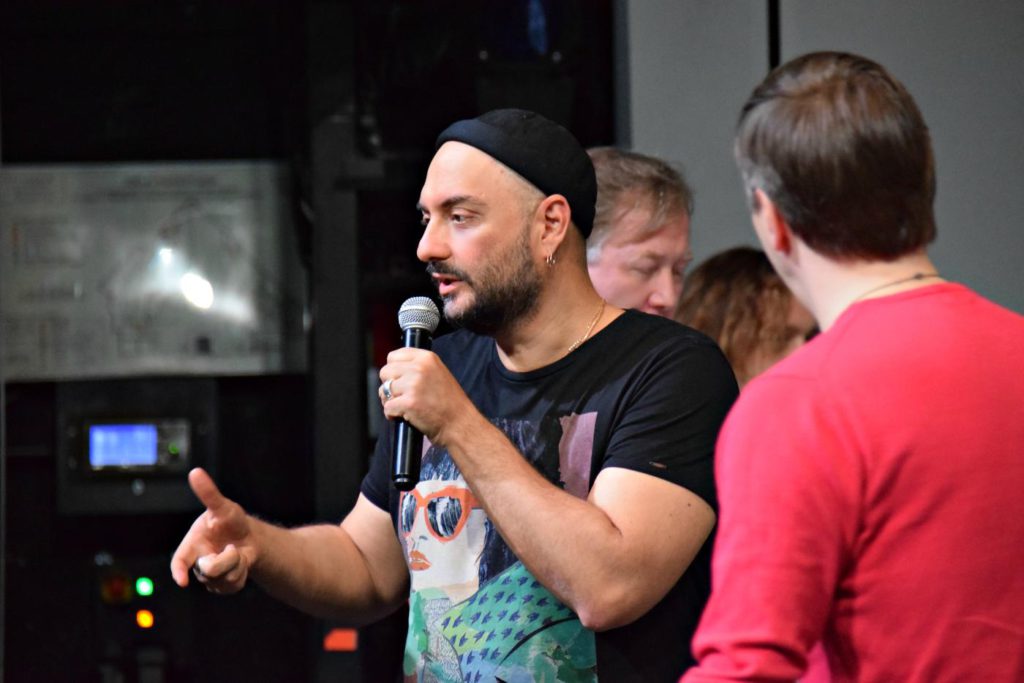 V. Pecheykin:
V. Pecheykin:
How do I try to understand the logic of power? I’ll give you an example. During elections in Russia, there’s a phenomenon called “carousel” – which means that certain people are carried by bus from one polling spot to the next to vote multiple times. You are paid for this. A friend of mine accepted an offer to vote for a certain party at ten different polling spots – and voted ten times against it! I try to find a similar logic for myself in the whole affair.
S. Zekri:
One of you mentioned that you hope for the support of German politicians. That would be another topic, but given the limited time, we agreed that the audience should now have the opportunity to ask questions.
Question from the audience:
You have talked openly about the situation in your home country, and Russia isn’t portrayed in a favorable light in this affair. Do you worry about facing consequences when you return home?
M. Davydova:
I’ve been talking very openly for years and always have returned home. That has become my life-style. I’ve discussed this issue several times already with Kirill and we agreed to do what we deem right as long as we’re able to. Since I still have the opportunity for this, I’ll continue.
S. Newski:
I can only agree with Marina.
Question from the audience:
How is the support by the west for Kirill Serebrennikov perceived in Russia? Recently, the German Bundestagspräsident declared his solidarity with Kirill Serebrennikov during a visit in St. Petersburg, for example.
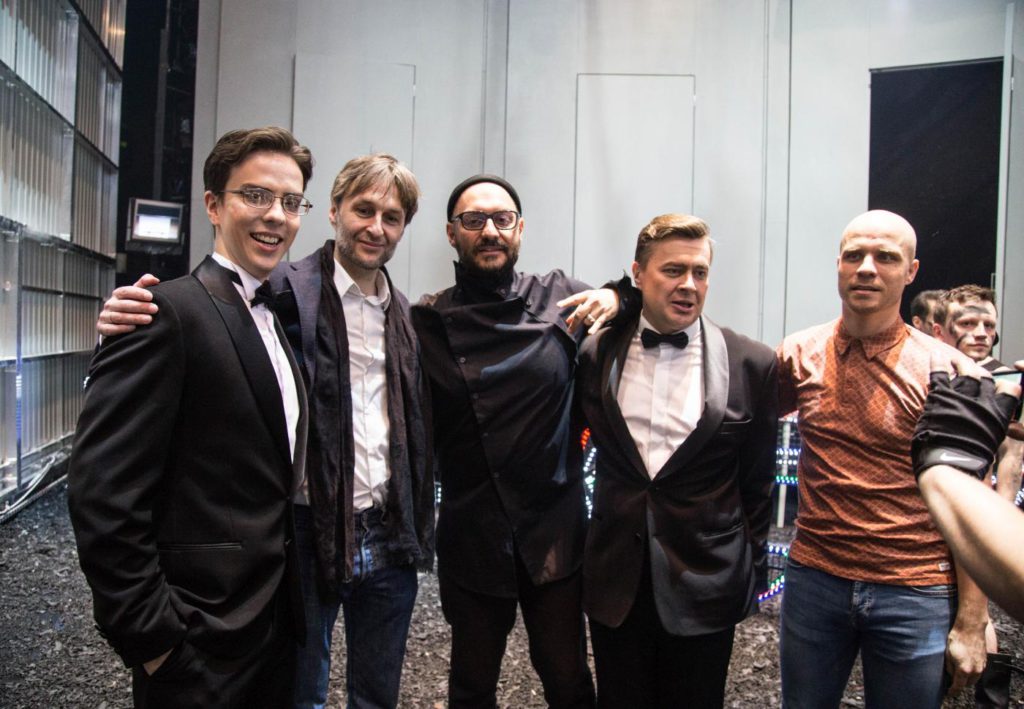 V. Pecheykin:
V. Pecheykin:
It simply helps to know that one isn’t alone. It helps on a basic level – it’s very, very important. Many thanks, therefore!
S. Newski:
Recent Russian history shows that there is one rule – although the evil doesn’t have rules. We saw that the political prisoners we fought for were indeed released – sooner or later. Each and every act of solidarity is important. Every symbolic act is important, but in order for us to be successful, political pressure from abroad is crucial. We’re grateful for every bit of support.
Question from the audience:
Friends and colleagues – people of my generation born in Russia – point out that a society of values needs to be re-established in Russia and that power must be utilized for this. Is there a general trend towards ultra-conservative values in Russia? Away from artistic freedom and homosexuality?
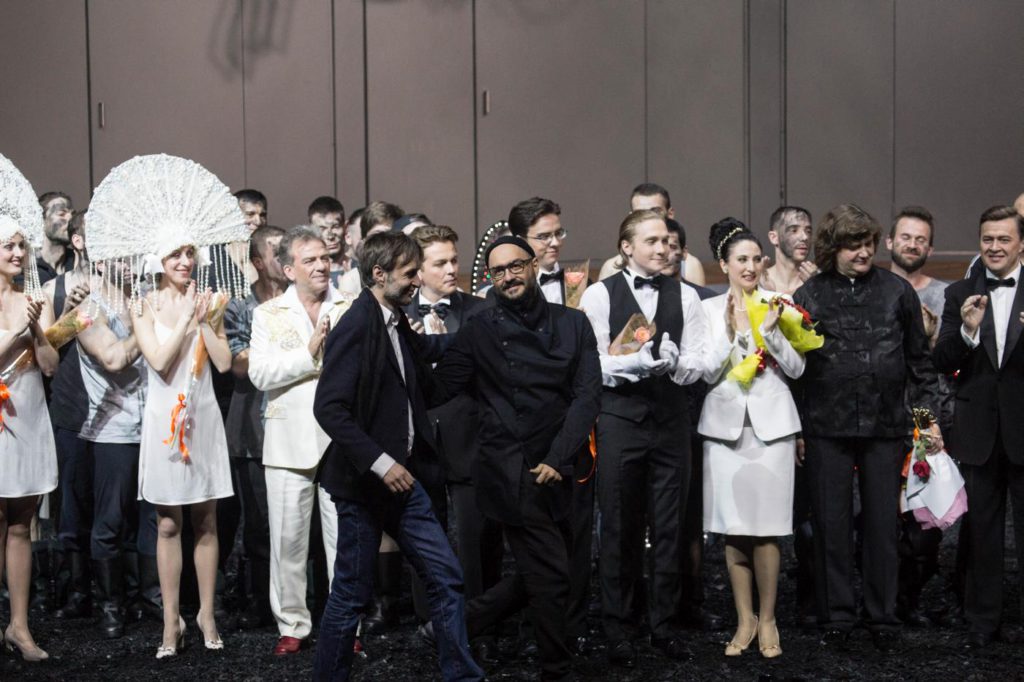 S. Newski:
S. Newski:
It’s a bit difficult to answer this question, because I avoid contact with people who have homophobic or anti-Semitic opinions. But yes, such people exist.
M. Davydova:
Ultra-orthodox forces exist. They are homophobic and champion everything that comes with that. But this doesn’t allow for conclusions about what is basically happening in Russia and what I like to call a “total conservative revolution”. We live in a society that partly adores the Russian Tsar, whom they regard a martyr, and where people crash their trucks into cinemas when the film “Mathilde” is on the program. Simultaneously, other forces exist that adore Stalin and applaud every Bolshevik leader who destroyed as many churches as possible. The discrepancy between the two movements is much smaller than the discrepancy between them and us.
S. Newski:
You can see the return to conservative values in Poland and Hungary. In Poland, for example, there’s a movement against induced abortion – but there’s a much bigger problem in Russia. The concern is that society gradually develops a pattern of thinking of secret service members – and one of this faction is ruling the country.
The main problem in Russia isn’t a conservative ideology that became mainstream, but an artificially cultivated relativism – the perception that everyone lies, steals, and abuses their power. In short – everyone is bad. It’s a world view of secret service members that is forced upon the entire country. That’s the main problem, the creeping fascism isn’t. Peter Pomerantsev described it exactly in his book “Nothing is True and Everything is Possible”. It’s the so-called post-truth, a conception of the world that implies all other problems.
S. Zekri:
I had hoped – although not really expected – to end this talk on a positive note – something that is not as desolate as the situation in Russia currently seems to be. I think what gives me hope is the presence of three people from Russia’s cultural scene who also work in Germany and who represent communication between Russians and Germans interested in the art that is – regardless of any challenges – intense.
(Translation from German to English by the author; the talk has been edited for clarity. Photos by courtesy of Stuttgart State Opera, Gogol Center Moscow, and Helikon-Opera Moscow)
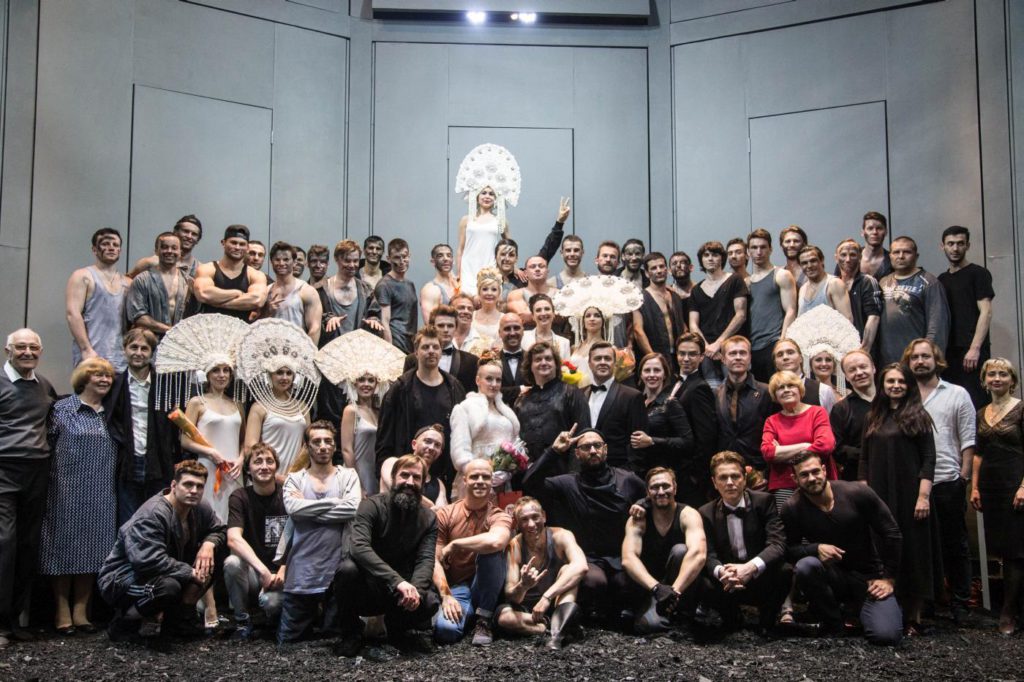
| Links: | Website of the Stuttgart State Opera | |
| Website of the Gogol Center Moscow | ||
| Website of the Helikon-Opera Moscow | ||
| Photos: | 1. | Kirill Serebrennikov, Stuttgart State Opera 2017 © A.T. Schaefer |
| 2. | “Hansel and Gretel” by Engelbert Humperdinck, directed by Kirill Serebrennikov, film still, Stuttgart State Opera 2017 © Stuttgart State Opera | |
| 3. | Kirill Serebrennikov in Stuttgart, Stuttgart State Opera 2017 © Dominique Brewing | |
| 4. | Gogol Center Moscow © Gogol Center | |
| 5. | Kirill Serebrennikov, Gogol Center Moscow © Ira Polyarnaya | |
| 6. | Gogol Center Moscow © Gogol Center | |
| 7. | Gogol Center Moscow © Gogol Center | |
| 8. | Gogol Center Moscow © Gogol Center | |
| 9. | Gogol Center Moscow © Gogol Center | |
| 10. | Kirill Serebrennikov, Gogol Center Moscow © Ira Polyarnaya | |
| 11. | Tamara Eshba, Pavel Kaplevich, Alexandr Manotskov, Eugene Kulagin, Kirill Serebrennikov, Felix Korobov and Denis Azarov during rehearsals for “Chaadsky” by Alexander Manotskov, directed by Kirill Serebrennikov, Helikon-Opera Moscow 2017 © Irina Shymchak | |
| 12. | Kirill Serebrennikov and Alexey Tregubov during rehearsals for “Chaadsky” by Alexander Manotskov, directed by Kirill Serebrennikov, Helikon-Opera Moscow 2017 © Irina Shymchak | |
| 13. | Kirill Serebrennikov during rehearsals for “Chaadsky” by Alexander Manotskov, directed by Kirill Serebrennikov, Helikon-Opera Moscow 2017 © Irina Shymchak | |
| 14. | Kirill Serebrennikov during rehearsals for “Chaadsky” by Alexander Manotskov, directed by Kirill Serebrennikov, Helikon-Opera Moscow 2017 © Irina Shymchak | |
| 15. | Kirill Serebrennikov during rehearsals for “Chaadsky” by Alexander Manotskov, directed by Kirill Serebrennikov, Helikon-Opera Moscow 2017 © Irina Shymchak | |
| 16. | After the premiere of “Chaadsky” by Alexander Manotskov, directed by Kirill Serebrennikov, Helikon-Opera Moscow 2017 © Anna Molyanova | |
| 17. | Curtain call after the premiere of “Chaadsky” by Alexander Manotskov, directed by Kirill Serebrennikov, Helikon-Opera Moscow 2017 © Anna Molyanova | |
| 18. | After the premiere of “Chaadsky” by Alexander Manotskov, directed by Kirill Serebrennikov, Helikon-Opera Moscow 2017 © Anna Molyanova | |
| Editing: | Jake Stepansky |
